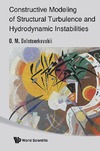The book provides an original approach in the research of structural analysis of free developed shear compressible turbulence at high Reynolds number on the base of direct numerical simulation (DNS) and instability evolution for ideal medium (integral conservation laws) with approximate mechanism of dissipation (FLUX dissipative monotone "upwind" difference schemes) and does not use any explicit sub-grid approximation and semi-empirical models of turbulence. Convective mixing is considered as a principal part of conservation law.
Appropriate hydrodynamic instabilities (free developed shear turbulence) are investigated from unique point of view. It is based on the concept of large ordered structures with stochastic core of small scale developed turbulence ("turbulent spot"). Decay of "turbulent spot" are simulated by Monte Carlo method. Proposed approach is based on two hypotheses: statistical independence of the characteristic of large ordered structures (LOS) and small-scale turbulence (ST) "and" weak influence of molecular viscosity (or more generally, dissipative mechanism) on properties of large ordered structures.
Two versions of instabilities, due to Rayleigh-Taylor and Richtmyer Meshkov are studied detail by the three-dimensional calculations, extended to the large temporal intervals, up to turbulent stage and investigation turbulent mixing zone (TMZ).
The book covers both the fundamental and practical aspects of turbulence and instability and summarizes the result of numerical experiments conducted over 30 years period with direct participation of the author.
In the book are cited the opinions of the leading scientists in this area of research: Acad. A S Monin (Russia), Prof. Y Nakamura (Japan, Nagoya University) and Prof. F Harlow (USA, Los-Alamos).
Contents: Constructive Modeling of Free Developed Turbulence — Coherent Structures, Laminar-Turbulent Transition, Chaos; Modeling of Richtmyer Meshkov Instability; Rayleigh Taylor Instability: Analysis and Numerical Simulation; Direct Statistical Approach for Aerohydrodynamic Problems; Appendices: ; Computational Experiment: Direct Numerical Simulation of Complex Gas-Dynamical Flows on the Basis of Euler, Navier Stokes, and Boltzmann Models; Formation of Large-Scale Structures in the Gap Between Rotating Cylinders: The Rayleigh Zeldovich Problem; Universal Technology of Parallel Computations for the Problems Described by Systems of the Equations of Hyperbolic Type: A Step to Supersolver; Supercomputers in Mathematical Modeling of the High Complexity Problems; On Nuts and Bolts Structural Turbulence and Hydrodynamic Instabilities.
 |
|
О проекте
|
|
О проекте


